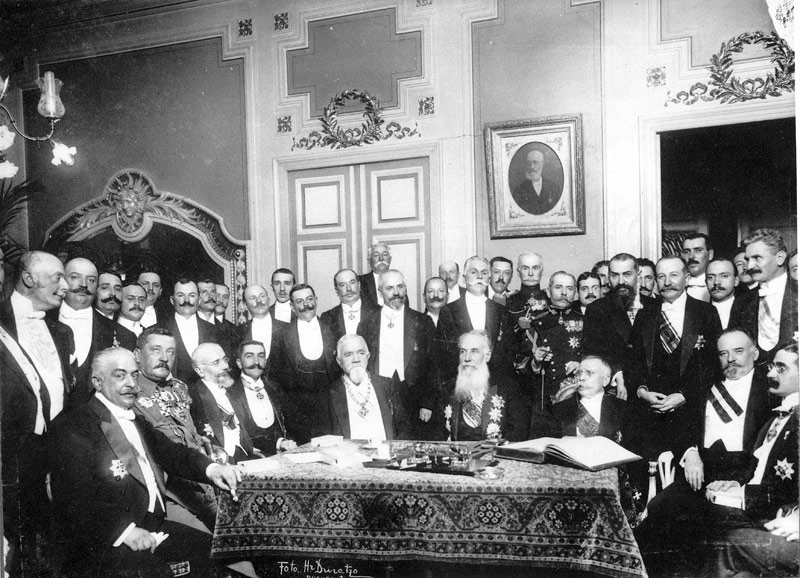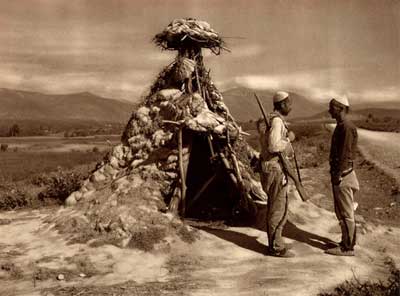|
Army Of The Kingdom Of Serbia
The Army of the Kingdom of Serbia ( sr-cyr, Војска Краљевине Србије, Vojska Kraljevine Srbije), known in English as the Royal Serbian Army, was the army of the Kingdom of Serbia that existed between 1882 and 1918, succeeding the Armed Forces of the Principality of Serbia and preceding the Royal Yugoslav Army. Organization Field armies * First Army (Serbia) * Second Army (Serbia) * Third Army (Serbia) * Timok Army * Užice Army Orders of battle * Order of battle of the Serbian Army in the First Balkan War * Order of battle of the Serbian Army in World War I Wars Military equipment Armament Uniform *Šajkača See also * First Serbian Volunteer Division * Serbian Chetnik Organization * Serbian Army The Serbian Army ( sr-cyr, Копнена војска Србије, Kopnena vojska Srbije, lit=Serbian Land Army) is the land-based and the largest component of the Serbian Armed Forces. History Originally established in 1830 as the Army of Pr ... Ref ... [...More Info...] [...Related Items...] OR: [Wikipedia] [Google] [Baidu] |
Army
An army (from Old French ''armee'', itself derived from the Latin verb ''armāre'', meaning "to arm", and related to the Latin noun ''arma'', meaning "arms" or "weapons"), ground force or land force is a fighting force that fights primarily on land. In the broadest sense, it is the land-based military branch, service branch or armed service of a nation or country. It may also include aviation assets by possessing an army aviation component. Within a national military force, the word army may also mean a field army. In some countries, such as France and China, the term "army", especially in its plural form "armies", has the broader meaning of armed forces as a whole, while retaining the colloquial sense of land forces. To differentiate the colloquial army from the formal concept of military force, the term is qualified, for example in France the land force is called ''Armée de terre'', meaning Land Army, and the air and space force is called ''Armée de l'Air et de l’Esp ... [...More Info...] [...Related Items...] OR: [Wikipedia] [Google] [Baidu] |
First Balkan War
The First Balkan War ( sr, Први балкански рат, ''Prvi balkanski rat''; bg, Балканска война; el, Αʹ Βαλκανικός πόλεμος; tr, Birinci Balkan Savaşı) lasted from October 1912 to May 1913 and involved actions of the Balkan League (the Kingdoms of Kingdom of Bulgaria, Bulgaria, Kingdom of Serbia, Serbia, Kingdom of Greece, Greece and Kingdom of Montenegro, Montenegro) against the Ottoman Empire. The Balkan states' combined armies overcame the initially numerically inferior (significantly superior by the end of the conflict) and strategically disadvantaged Ottoman armies, achieving rapid success. The war was a comprehensive and unmitigated disaster for the Ottomans, who lost 83% of their European territories and 69% of their European population. [...More Info...] [...Related Items...] OR: [Wikipedia] [Google] [Baidu] |
World War I
World War I (28 July 1914 11 November 1918), often abbreviated as WWI, was one of the deadliest global conflicts in history. Belligerents included much of Europe, the Russian Empire, the United States, and the Ottoman Empire, with fighting occurring throughout Europe, the Middle East, Africa, the Pacific, and parts of Asia. An estimated 9 million soldiers were killed in combat, plus another 23 million wounded, while 5 million civilians died as a result of military action, hunger, and disease. Millions more died in genocides within the Ottoman Empire and in the 1918 influenza pandemic, which was exacerbated by the movement of combatants during the war. Prior to 1914, the European great powers were divided between the Triple Entente (comprising France, Russia, and Britain) and the Triple Alliance (containing Germany, Austria-Hungary, and Italy). Tensions in the Balkans came to a head on 28 June 1914, following the assassination of Archduke Franz Ferdin ... [...More Info...] [...Related Items...] OR: [Wikipedia] [Google] [Baidu] |
Balkans Theatre
The Balkans theatre, or Balkan campaign was a theatre of World War I fought between the Central Powers (Austria-Hungary, Kingdom of Bulgaria, Bulgaria, German Empire, Germany and the Ottoman Empire) and the Allies of World War I, Allies (Kingdom of Serbia, Serbia, Kingdom of Montenegro, Montenegro, French Third Republic, France, the United Kingdom of Great Britain and Ireland, United Kingdom, Russian Empire, Russia, Kingdom of Italy, Italy and later Kingdom of Greece, Greece). The campaign began in 1914 with three failed Austro-Hungarian Serbian campaign of World War I#1914, offensives into Serbia. A new attempt a year later by the combined forces of Austria-Hungary, Germany and Bulgaria led to the Serbian campaign#1915, conquest and occupation of Serbia and Montenegrin campaign, Montenegro. The Serbian army did not surrender but Great Retreat (Serbian), retreated through the mountains of Albania and was evacuated to Corfu before reforming in Salonika a few months later. On the ... [...More Info...] [...Related Items...] OR: [Wikipedia] [Google] [Baidu] |
Treaty Of Bucharest (1913)
The Treaty of Bucharest ( ro, Tratatul de la București; sr, Букурештански мир; bg, Букурещки договор; gr, Συνθήκη του Βουκουρεστίου) was concluded on 10 August 1913, by the delegates of Bulgaria, Romania, Serbia, Montenegro and Greece. The Treaty was concluded in the aftermath of the Second Balkan War and amended the previous Treaty of London, which ended the First Balkan War. About one month later, the Bulgarians signed a separate border treaty (the Treaty of Constantinople) with the Ottomans, who had regained some territory west of the Enos-Midia Line during the second war. Background Bulgaria, dissatisfied with its gains in the First Balkan War, and especially with Greek and Serbian gains in Macedonia, launched an attack on its former allies in June 1913. The attacks were driven back, and the Greek and Serbian armies invaded Bulgarian-held territory in return. At the same time, the Ottomans advanced into Eastern T ... [...More Info...] [...Related Items...] OR: [Wikipedia] [Google] [Baidu] |
Kachaks
Kachaks ( sq, kaçak, sr, качаци / ''kačaci'') is a term used for the Albanian bandits active in the late 19th and early 20th century in northern Albania, Montenegro, Kosovo and Macedonia, and later as a term for the militias of Albanian revolutionary organizations against the Kingdom of Serbia (1910–18) Kingdom of Yugoslavia (1918–24), called the "Kaçak movement". Etymology The word is derived from Turkish '' kaçmak'' for "outlaw". Background History 1920–24 Kachak movement The Committee for the National Defense of Kosovo () was created in Shkodër, under Hasan Prishtina, in 1918. The committee organizationally and financially supported the kachaks in Albanian-populated areas of Yugoslavia, in Kosovo and Skopje (the former Kosovo Vilayet). Kachaks were also active around Ohrid and Bitola. On 6 May 1919 the Committee called for a general uprising in Kosovo and other Albanian-inhabited regions in Yugoslavia. The Kachaks were popular among Albanians, and local s ... [...More Info...] [...Related Items...] OR: [Wikipedia] [Google] [Baidu] |
Internal Macedonian Revolutionary Organization
The Internal Macedonian Revolutionary Organization (IMRO; bg, Вътрешна Македонска Революционна Организация (ВМРО), translit=Vatrešna Makedonska Revoljucionna Organizacija (VMRO); mk, Внатрешна Македонска Револуционерна Организација, translit=Vnatrešna Makedonska Revolucionerna Organizacija), was a secret revolutionary society founded in the Ottoman territories in Europe, that operated in the late 19th and early 20th centuries. Founded in 1893 in Salonica, initially, it aimed to gain autonomy for Macedonia (region), Macedonia and Adrianople Vilajet, Adrianople regions in the Ottoman Empire, however, later it became an agent serving Kingdom of Bulgaria, Bulgarian interests in Balkan politics. IMRO group modeled itself after the Internal Revolutionary Organization of Vasil Levski and accepted its motto "Freedom or Death" (Свобода или смърть). Starting in 1896 it fought t ... [...More Info...] [...Related Items...] OR: [Wikipedia] [Google] [Baidu] |
Second Balkan War
The Second Balkan War was a conflict which broke out when Bulgaria, dissatisfied with its share of the spoils of the First Balkan War, attacked its former allies, Serbia and Greece, on 16 ( O.S.) / 29 (N.S.) June 1913. Serbian and Greek armies repulsed the Bulgarian offensive and counter-attacked, entering Bulgaria. With Bulgaria also having previously engaged in territorial disputes with Romania and the bulk of Bulgarian forces engaged in the south, the prospect of an easy victory incited Romanian intervention against Bulgaria. The Ottoman Empire also took advantage of the situation to regain some lost territories from the previous war. When Romanian troops approached the capital Sofia, Bulgaria asked for an armistice, resulting in the Treaty of Bucharest, in which Bulgaria had to cede portions of its First Balkan War gains to Serbia, Greece and Romania. In the Treaty of Constantinople, it lost Adrianople to the Ottomans. The political developments and military preparations f ... [...More Info...] [...Related Items...] OR: [Wikipedia] [Google] [Baidu] |
Treaty Of London (1913)
The Treaty of London (1913) was signed on 30 May following the London Conference of 1912–1913. It dealt with the territorial adjustments arising out of the conclusion of the First Balkan War. The London Conference had ended on 23 January 1913, when the 1913 Ottoman coup d'état took place and Ottoman Grand Vizier Kâmil Pasha was forced to resign. Coup leader Enver Pasha withdrew the Ottoman Empire from the Conference, and the Treaty of London was signed without the presence of the Ottoman delegation. Combatants The combatants were the victorious Balkan League (Serbia, Greece, Bulgaria, and Montenegro) and the defeated Ottoman Empire. Representing the Great Powers were the United Kingdom, Germany, Russia, Austria-Hungary, and Italy. History Hostilities had officially ceased on 2 December 1912, except for Greece that had not participated in the first truce. Three principal points were in dispute: * the status of the territory of present-day Albania, the vast majority of wh ... [...More Info...] [...Related Items...] OR: [Wikipedia] [Google] [Baidu] |
Circassians
The Circassians (also referred to as Cherkess or Adyghe; Adyghe and Kabardian: Адыгэхэр, romanized: ''Adıgəxər'') are an indigenous Northwest Caucasian ethnic group and nation native to the historical country-region of Circassia in the North Caucasus. As a consequence of the Circassian genocide, which was perpetrated by the Russian Empire in the 19th century during the Russo-Circassian War, most Circassians were exiled from their homeland in Circassia to modern-day Turkey and the rest of the Middle East, where the majority of them are concentrated today. The Unrepresented Nations and Peoples Organization estimated in the early 1990s that there are as many as 3.7 million Circassians in diaspora in over 50 countries. The Circassian language is the ancestral language of the Circassian people, and Islam has been the dominant religion among them since the 17th century. Circassia has been subject to repeated invasions since ancient times; its isolated terrain coupled wi ... [...More Info...] [...Related Items...] OR: [Wikipedia] [Google] [Baidu] |
Armenians
Armenians ( hy, հայեր, ''hayer'' ) are an ethnic group native to the Armenian highlands of Western Asia. Armenians constitute the main population of Armenia and the ''de facto'' independent Artsakh. There is a wide-ranging diaspora of around five million people of full or partial Armenian ancestry living outside modern Armenia. The largest Armenian populations today exist in Russia, the United States, France, Georgia, Iran, Germany, Ukraine, Lebanon, Brazil, and Syria. With the exceptions of Iran and the former Soviet states, the present-day Armenian diaspora was formed mainly as a result of the Armenian genocide. Richard G. Hovannisian, ''The Armenian people from ancient to modern times: the fifteenth century to the twentieth century'', Volume 2, p. 421, Palgrave Macmillan, 1997. Armenian is an Indo-European language. It has two mutually intelligible spoken and written forms: Eastern Armenian, today spoken mainly in Armenia, Artsakh, Iran, and the former Soviet ... [...More Info...] [...Related Items...] OR: [Wikipedia] [Google] [Baidu] |








